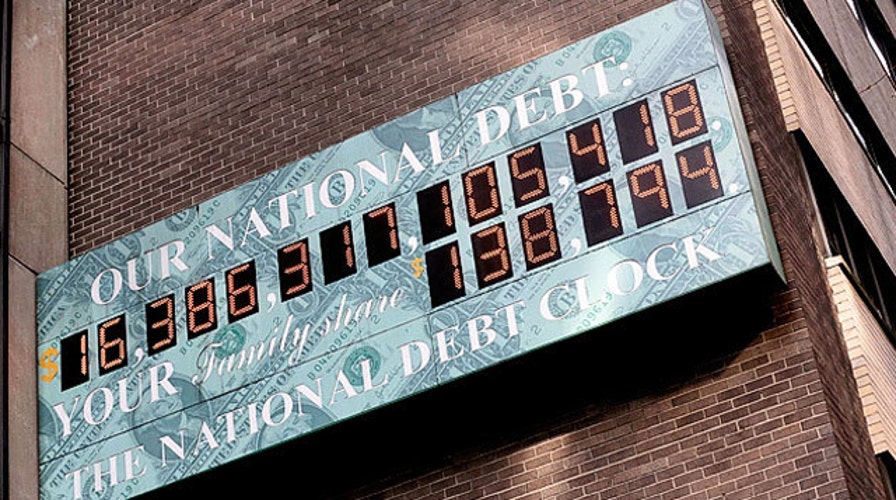Taxpayer calculator: Your share of government interest
Federal government will pay $229 billion in interest in 2015
No one can really say absolutely what the American income tax system allows or prohibits. Not the IRS, not the legislators who wrote it and not the most sophisticated tax experts.
When it comes to complexity the income tax code has few rivals. Its labyrinthine construction, like layers of three dimensional origami cemented together over a hundred years, has created incomprehensible nooks and crannies…and fear and revulsion by both average Americans and businesses.
When it comes to complexity the income tax code has few rivals. Its labyrinthine construction, like layers of three dimensional origami cemented together over a hundred years, has created incomprehensible nooks and crannies…and fear and revulsion by both average Americans and businesses.
When it comes to complexity the income tax code has few rivals. Its labyrinthine construction, like layers of three dimensional origami cemented together over a hundred years, has created incomprehensible nooks and crannies…and fear and revulsion by both average Americans and businesses.
There are more tax preparers than police officers in the United States. About 20 percent of what is raised in federal income taxes will be spent this year on tax preparation costs--paid out simply to comply with a law that is like a demanding Frankenstein monster who has had additional surgery every year for a century. For the average American, tax day costs an average of about $270 in tax preparation help to avoid facing a minimum of five hours of mind numbing work to complete a form 1040. The instructions run a hundred pages.
Tax preparers love the income tax because it is big business—about $6 billion in revenues in 2012. Washington, D.C. lobbyists toast it with the costliest champagne because there is no richer client than those looking for legislative tax breaks. And tax lawyers love it because clients will pay $800 an hour and more to find and defend one of a million ways to game the system.
An “abomination” is a fair description of our income tax system: Something that is greatly disliked and abhorred and which represents a shameful condition.
For our economy the income tax system is deadweight greater than the profits of the most successful American businesses combined. Our tax code drives more American jobs overseas than any other single factor. Perversely, foreign-based businesses actually get a tax advantage when selling their products in the United States. And Americans living abroad are dropping their citizenship in record numbers this year because new IRS compliance rules on foreign banks and taxpayers abroad are universally described as a “nightmare” of Kafkaesque proportions.
It began as a flat tax that affected few and was easy to calculate. This year the average American will work until April 24th to pay all taxes owed.
Taxing income itself was originally specifically banned by the Founding Fathers as immoral. Only the ratification of the 16th amendment in February 1913 allowed our federal government to legally apportion direct taxes. The legislation itself began as a dare to Congressional Republicans, many of whom who voted for it believing states would never ratify such an expansion of federal powers.
World War Two saw the first imposition of “withholding” taxes from paychecks ahead of when federal taxes are actually owed—and today, withholding too little results in a penalty from the IRS. Today, most wage earners only know what their “take home” pay is and pay little attention to what they earn before taxes are withheld.
For politicians there is simply no better issue with which to divide Americans from each other than the income tax system. “Businesses paying their fair share” is also a useful, if patently deceptive, rallying cry, to raise (passed along) taxes on consumers while pretending to tax businesses. This year the 16 percent of Americans called “rich” (earning more than $125,000) will pay a “fair share” of more than 70 percent of all personal income taxes. More than 44 percent of citizens will pay no income taxes at all.
There are three commonly accepted paths to a simpler tax system. Simplifying existing tax brackets and closing loopholes (most favored by those who work in Washington, D.C.) a national retail consumption tax called the FairTax (with a die-hard army of legislative sponsors) and the simple Flat Tax championed by business leader and former presidential candidate, Steve Forbes.
But the “gatekeepers” of any tax reform progress remain not the citizenry but those in Washington, D.C. who profit most from a system most Americans hate. These “high priests” of the American tax system have real clout and their voices will be hidden when this year’s crop of presidential candidates again begins promising the relief that never seems to arrive.

